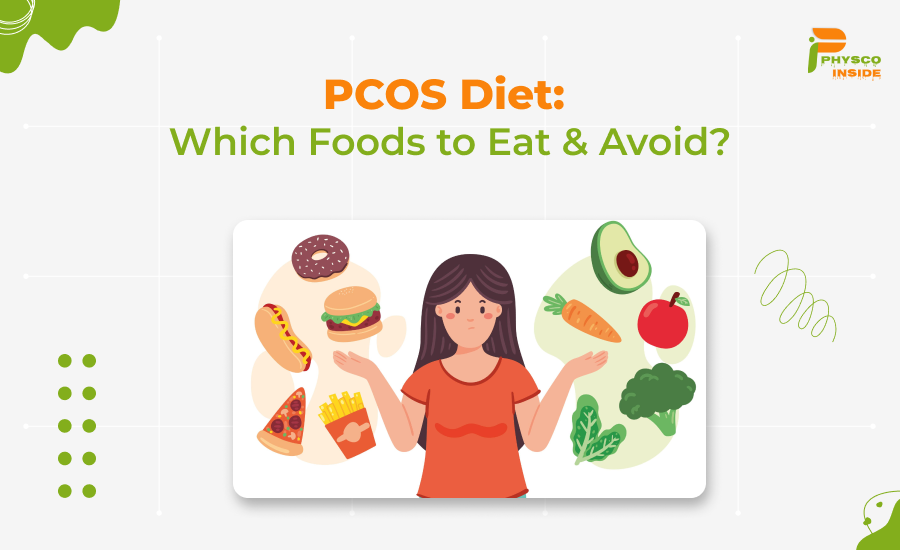(1) Introduction
PCOS Diet assumes a Fundamental part in PCOS management by Impacting hormone Balance, insulin Responsiveness, and anti-inflammation properties. Adopting a balanced diet rich in entire food sources, low in Processed Sugars, and high in fiber can assist with Reducing side effects and advance overall health.
To Understand What is PCOS actually, PCOS is Polycystic Ovarian Syndrome. It is a usual Hormonal Disorder found mostly in the female during their Reproductive years. A woman’s peak reproductive years are between the late teens and late 20s. It can cause a range of symptoms and may have long-term health implications.
You can Click here to understand the causes, symptoms, and other medical treatments.
(2) Which Foods to Eat for PCOS?
Polycystic ovarian Syndrome Nutrition is highly recommended by expert Dietitians as a PCOS Diet. These include Vegetables, Healthy Fats, Lean Protein, Berries and Whole Grains. The Nutritional impact of these pcos-friendly diets can easily be understood by reading the following precious Writing.

(2.1) Healthy Fats
Due to anti-PCOS characteristics of healthy fats like Hormone Regulation, Insulin Sensitivity, Satiety, Weight Management, Nutrient Absorption Capacity, and Psychological Health Properties. To understand the reason why these Characteristics matter, follow the details below:
(2.1.1) Hormone Regulation
(2.1.2) Insulin Sensitivity
(2.1.3) Satiety and Weight Management
(2.1.4) Nutrient Absorption:
Fat-Soluble Vitamins: A few Essential Vitamins (like A, D, E, and K) are Fat-Soluble, meaning they are better Ingested when Consumed with fats. These Vitamins assume different parts in Conceptive Health, bone Health, and Resistance Power.
(2.1.5) Mental Health
Mood and Cognitive Function: Omega-3 fatty acids, in particular, are Associated with Improved mood and Cognitive function. Given the Increased risk of mood Disorders in individuals with PCOS, Incorporating healthy fats may have positive effects on mental Health.
(2.1.6) What are the Sources of Healthy Fats for PCOS?
(2.2) Vegetables as PCOS Diet
Why do you choose Vegetables for PCOS?
Due to the Anti-PCOS Characteristics of Vegetables like Nutrient Density, Fiber Content, Low Glycemic Index, Anti-Inflammatory Properties, Weight Management, Hormone Balance, Gut Health, and Heart Health. To understand the reason why these Characteristics matter, follow the details below:
(2.2.1) Fiber Content:
Vegetables are an amazing source of Dietary fiber. Fiber directs glucose levels by slowing the Ingestion of sugars, Advancing satiety, and further developing insulin resistance. This can be especially advantageous for people with PCOS who might Encounter insulin resistance.
(2.2.2) Nutrient Density:
Vegetables are Enriched with Fundamental Nutrients like Vitamins, Minerals, fiber, and Antioxidants. These Nutrients are vital for general Health and can support the body’s different Capabilities.
(2.2.3) Low Glycemic Index:
Numerous Vegetables have a low Glycemic Index, meaning they Insignificantly affect glucose levels. Consuming low-GI food sources can assist with the Prevention of quick spikes and crashes in glucose, which is significant for Managing insulin resistance Frequently connected with PCOS.
(2.2.4) Anti-Inflammatory Properties:
Certain Vegetables, particularly those Enriched with Anti-oxidants and Phytochemicals, have Anti-Inflammatory Properties. Persistent Inflammation is connected to different Ailments, including PCOS, and Healthy food Varieties can be simple.
(2.2.5) Gut Health:
The fiber in Vegetables improves a healthy Gut Microbiota. A Sensible and diverse Gut Microbiome is related to better overall health and may have Options for Managing PCOS.
(2.2.6) Heart Health:
Vegetables are Heart-Healthy and can add to keeping up with Cardiovascular Health. People with PCOS might have an Expanded risk of Cardiovascular issues, making a Cardiac-friendly Diet significant for overall prosperity and health.
(2.2.7) Weight Management:
Vegetables are low in Calories and high in fiber, so settling on them is an amazing decision for those planning to deal with their weight. Weight management is often a significant part of PCOS management, as excess weight can worsen symptoms.
(2.2.8) Hormone Balance:
Some Vegetables contain Compounds that may Contribute to hormone balance. For instance, Cruciferous Vegetables like Broccoli and Brussels sprouts contain indole-3-carbinol, which might assist with regulating estrogen levels.
(2.3) What are the Tips for Including Vegetables in Nutrition Plan for PCOS?
(3) Lean Proteins as PCOS Foods
Why is Lean Protein Beneficial for Polycystic Ovarian Syndrome?
Lean Proteins are Beneficial for individuals with PCOS for several reasons due to their properties like Blood Sugar Regulation, Satiety, Weight Management, Muscle Health, Hormone Balance, and Nutrient Density. To understand the reason why these Characteristics matter, follow the Nutrition for PCOS below:
(3.1) Blood Sugar Regulation:
Lean Proteins Negligibly affect glucose levels Compared with carbs. Including Lean Proteins in meals assists with slowing down the assimilation of carbs, prompting more steady glucose levels. This is significant for Managing insulin resistance, which is normal in PCOS.
(3.2) Satiety and Weight Management:
Protein is more satisfying than carbs or fats, meaning it assists you with feeling fuller for longer. Introducing lean Proteins for meals and Tidbits(snacks) can assist with Controlling hunger and decrease the Probability of over-eating, which is significant for weight management. Attaining a normal weight can assist with further Developing PCOS symptoms and decrease the risk of Inconvenience.
(3.3) Muscle Health:
Lean Proteins give Fundamental amino acids important to muscle repair and development. The usual Utilization of lean Proteins upholds muscle Well-being, which is significant for general Digestion and actual Capability.
(3.4) Hormone Balance:
Protein assumes a part in chemical union and Guidelines. Introducing lean Proteins for a Balanced diet can assist with Supporting Hormonal balance, which might be valuable for people with PCOS who experience uneven Hormonal Characteristics, especially raised degrees of Androgens (male hormone).
(3.5) Nutrient Density:
Lean Proteins are regularly Plentiful in Nutrients like Vitamins, Minerals, and Antioxidants. Integrating PCOS-friendly diet sources into the eating routine guarantees that people with PCOS get Essential Nutrients vital for Well-being and Prosperity.
What are the Sources of Lean Protein?
Examples of lean protein sources include poultry (like chicken and turkey), fish (like salmon, fish, and trout), tofu, Vegetables (like beans, lentils, and Chickpeas), and low-fat dairy items, (for example, yogurt and curds).
(4) Whole Grains as PCOS Diet
Why Whole Grains are useful for this Syndrome?
Due to the Anti-PCOS Properties of Whole Grains like Low Glycemic Index(GI), Fiber Content, Nutrient Density, Weight Management, and Anti-inflammation. To understand the reason why these Properties matter, follow the details below:
(4.1) Low Glycemic Index(GI):
Whole grains have a lower Glycemic index compared with refined grains. This suggests they are Digested more slowly, Prompting a Continuous rise in glucose levels as opposed to an unexpected spike. Stable glucose levels can help in Managing insulin resistance, which is normally connected with PCOS.
(4.2) Fiber Content:
Whole grains are rich in dietary fiber, which has a few advantages for people with PCOS. Fiber slows down the Retention of sugar in the circulation system, Preventing quick changes in blood glucose levels. Furthermore, fiber advances Sensations of satiety and can help with weight management by Diminishing general calorie intake and Supporting Gut-related Health.
(4.3) Nutrient Density:
Whole grains contain various Essential Nutrients, including Vitamins, Minerals, and Antioxidants. These Nutrients are significant for generally speaking Health and can assist with Supporting different Physical Processes, including Hormone Regulation and Metabolism.
(4.4) Supports Weight Management:
Maintaining a healthy weight is often a goal for individuals with PCOS, as excess weight can impair symptoms and increase the risk of Complications such as insulin resistance and Cardiovascular disease. Whole grains can add to weight management activities by giving Supported energy, Advancing satiety, and Supporting a decent eating routine.
(4.5) Anti-inflammatory Properties:
A few Whole grains, like oats and quinoa, contain Compounds with Explanatory Properties. Chronic Inflammation is accepted to assume a part in the turn of events and movement of PCOS-related symptoms, so Devouring calming Food Varieties like Whole grains might assist with releasing irritation and its Belongings.
(5) Berries as PCOS Diet
Berries, such as Blueberries, Strawberries, Raspberries, and Blackberries, offer numerous benefits for individuals with PCOS due to their Nutritional profile:
(5.1) Low Glycemic Index (GI):
Berries have a low Glycemic index, meaning they cause a continuous and consistent expansion in glucose levels contrasted with high-GI food sources. This can help in Managing insulin resistance, a typical Component of PCOS.
(5.2) Rich in Antioxidants:
Berries are loaded with antioxidants, including flavonoids, anthocyanins, and L-ascorbic acid. These cancer prevention agents assist with decreasing oxidative stress and irritation, which are much of the time raised in people with PCOS.
(5.3) High in Fiber:
Berries are a decent wellspring of dietary fiber, which can help with directing glucose levels, advancing satiety, and supporting gut-related health. Fiber slows down the retention of sugars, assisting with preventing spikes in insulin.
(5.4) Nutrient Dense:
despite being low in calories, berries are Nutrient-rich natural products. They give fundamental nutrients and minerals, like L-ascorbic acid, manganese, and potassium, which support general Health and resistance capability.
(5.5) Weight Management:
Integrating berries into a balanced diet can be useful for weight management, as they are low in calories and high in fiber, advancing sensations of satiety and lessening the probability of gorging (over-eating).
(5.6) Lipid Profile improvement:
Some exploration proposes that normal utilization of berries might assist with further developing lipid profiles by diminishing degrees of total cholesterol and LDL cholesterol, which are significant elements in decreasing CVD chance, frequently connected with PCOS.
(5.7) Versatile and Delicious:
Berries can be delighted in different ways, including new, frozen, or dried, and can be added to Smoothies, Yogurt, Mixed Greens, or eaten as a snack all alone. Their versatility makes it simple to integrate them into a Balanced diet.
In summary, berries are beneficial for individuals with PCOS due to their low glycemic index, high antioxidant content, fiber-rich nature, and potential benefits for weight management and cardiovascular health. Including a variety of berries as part of a balanced diet can back to overall health and may help manage symptoms related to PCOS.
(6) Which Foods to avoid for PCOS?
Some food items like Refined carbs, Sugary food items, beverages, Processed foods, dairy with added Hormones, and Red & Altered Meat are highly discouraged or avoided by Expert dietitians all over the Globe. To understand the phenomenon of why these items are not good, Follow the article complete.

(6.1) Sugary Foods and Beverages
Why are these Items not Good?
Sugary Food sources and Beverages intensify the side effects of Polycystic Ovary Disorder (PCOS) because of their effect on insulin levels. PCOS frequently includes insulin opposition, where cells don’t answer properly to insulin, stimulating high glucose levels. Utilization of sugary foods causes fast spikes in glucose, setting off additional insulin discharge. This sustains the insulin obstruction cycle, weakening PCOS side effects like unpredictable periods, weight gain, and fruitfulness issues. Furthermore, over-the-top sugar consumption adds to irritation and irregular hormonal characteristics, demolishing the condition. Thus, restricting Sugary food sources and Beverages is urgent for overseeing PCOS and advancing by and large well-being.
Examples of Sugary food sources and Beverages include:
(6.2) Dairy with Added Hormones
Examples of dairy products that may contain added hormones include:
It’s critical to take note that not all dairy items contain added Hormones, as certain makers decide to utilize chemical-free or natural practices. Notwithstanding, while buying dairy items, it’s wise to take a look at names or pick items that are marked as chemical-free or natural to limit openness to added Hormones.
Why it is not suitable as PCOS Diet?
Dairy items with added Hormones can fuel side effects of Polycystic Ovary Disorder (PCOS) because of their effect on Hormone levels. These additional Hormones, like estrogen and Androgen Hormones, can upset the fragile hormonal offset in people with PCOS, prompting expanded insulin opposition, aggravation, and unpredictable monthly cycles. Besides, they might add to the improvement of Ovarian growth and demolish side effects like skin inflammation and hirsutism. Picking chemical-free dairy items or plant-based choices can assist with alleviating these dangers and backing better administration of PCOS side effects.
(6.3) Processed Foods
Handled food varieties envelop a great many things that have been changed from their unique state through different strategies like cooking, freezing, canning, drying, or adding additives, flavorings, or different synthetic substances. Normal examples include:
In general, handled food sources will more often than not be high in refined sugars, undesirable fats, sodium, and fake added substances, making them less nutritious compared with entire, natural food sources.
Why are Processed Foods avoided as PCOS Diet?
Handled food sources, high in refined sugars, unsaturated fats, and added substances, worsen the side effects of PCOS. These food sources spike insulin levels, adding to insulin obstruction, a typical PCOS confusion. Also, they come up short on supplements, advancing irritation and hormonal unevenness, and disturbing PCOS side effects like sporadic periods, weight gain, and ripeness issues. The extreme calorie thickness of handled food varieties likewise prompts weight gain and deteriorating insulin opposition. Settling on entire, supplement-thick food sources like organic products, vegetables, lean proteins, and entire grains oversees PCOS side effects by settling glucose levels, lessening aggravation, and supporting hormonal balance. Staying away from handled food sources is critical for overseeing PCOS.
(6.4) Red and Handled Meats

What is Red Meat?
Red meats include hamburgers, pork, sheep, and veal. These meats are commonly hazier in variety because of higher Myoglobin Content and are frequently connected with more significant levels of soaked fats.
Handled Meats allude to meats that have gone through different techniques for protection or readiness, like restoring, smoking, or adding synthetic additives. Models include:
These meats are much of the time high in sodium, nitrates, and different added substances, which can have unfriendly well-being impacts when consumed in overabundance, especially for people with conditions like PCOS.
How does it impact?
Red and handled meats are negative for people with Polycystic Ovary Condition (PCOS) because of their elevated degrees of soaked fats, which can fuel insulin obstruction, a critical component of PCOS. Moreover, these meats frequently contain added substances and additives that can upset hormonal balance and diminish side effects. Studies propose that an eating regimen rich in plant-based proteins and inclined meats can further develop insulin resistance and general well-being in PCOS patients. In this manner, limiting the utilization of red and handled meats is prescribed to oversee PCOS.
(6.5) Refined Carbohydrates
What is Refined carbs?
Refined sugars are carbs that have been handled and deprived of their regular fiber, nutrients, and minerals. This handling regularly includes eliminating the wheat and microorganism layers from grains, like wheat, rice, and corn, leaving behind mostly the starchy endosperm. Normal examples of refined carbs include white bread, white rice, pasta produced using white flour, sweet cereals, baked goods, and most sorts of bites and pastries made with white flour and added sugars. These refined carbs will generally be processed rapidly by the body, prompting fast spikes in glucose and insulin levels, which can add to medical problems like obesity, insulin resistance, and metabolic disorders like PCOS.
How Refined carbohydrates interfere with PCOS?
Refined carbohydrates in the PCOS Diet worsen PCOS symptoms because of their quick assimilation, causing glucose spikes and insulin obstruction. This triggers hormonal imbalances characteristics, demolishing symptoms like irregular periods, weight gain, and skin inflammation. Besides, refined carbs need fiber and essential nutrients, advancing irritation and upsetting digestion. High insulin levels likewise stimulate androgen creation, disturbing PCOS symptoms like hirsutism and balding. Choosing whole grains, fruits, vegetables, and lean proteins rather than refined carbs can assist with settling glucose levels, managing weight, and reducing PCOS symptoms by further developing insulin resistance and hormonal balance.
(7) What are nutritional tips for PCOS Diet?
Conclusion
In a nutshell, the inclusion of Whole grains, Lean proteins, Fruits, Vegetables, and Healthy Fats can help to regulate Blood Glucose to avoid spikes, Weight management, and standardize hormones or other chemical substances. Avoiding processed foods, sugary snacks, and excessive red meats can alleviate insulin sensitivity and inflammation. Healthy lifestyle and moderation are principal factors, along with consulting healthcare professionals or registered dietitians for modified dietary recommendations. By making attentive food choices, individuals with PCOS can empower themselves to take control of their health and improve their overall Health.
FAQS
Answer: The best foods for PCOS acne include fruits, vegetables, whole grains, and lean proteins while avoiding sugary and processed foods to manage insulin levels and reduce inflammation
Answer: Berries (blueberries, strawberries, raspberries), apples, and pears are excellent choices as PCOS weight loss Diets due to their low glycemic index and high fiber content
Answer: Avoid sugary foods, refined carbs, processed meats, full-fat dairy, and excess caffeine. Limit alcohol and trans fats intake to manage PCOS symptoms effectively.
Answer: Yes, you can drink milk with PCOS, but opt for low-fat or skim options to reduce Saturated Fat intake. But Moderation is key.
Answer: Yes, PCOS Patients can eat chocolate. They should select dark chocolate which is high in cocoa and low in sugar. Dark chocolate is appropriate for PCOS it helps improve the insulin sensitivity of your Beta cells and promotes weight management.


